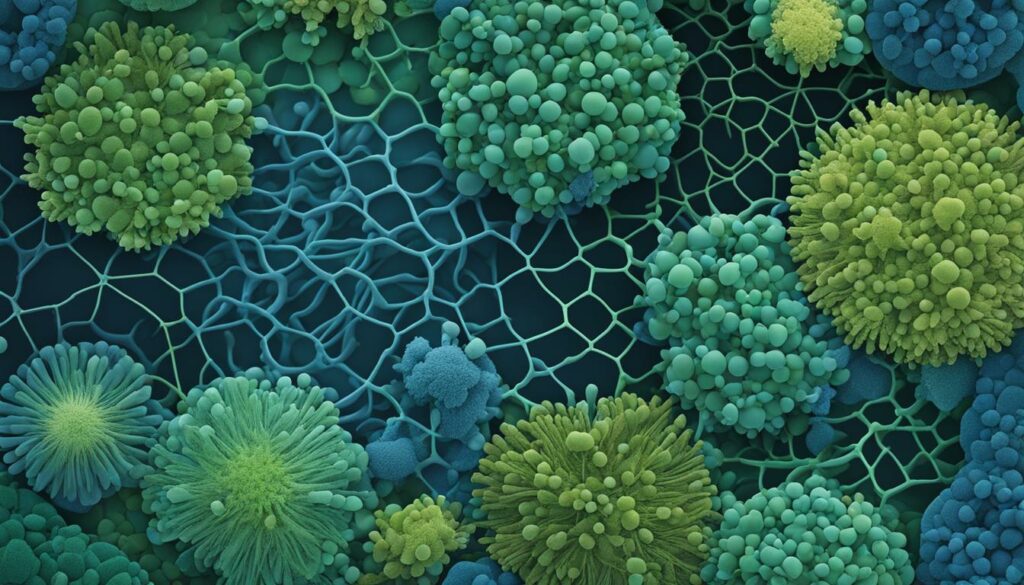The connection between gut health and sexual wellness is often overlooked in conventional medical treatments for sexual problems. However, research suggests that the gut’s microbiome plays an important role in sexual health.
The gut microbiome is a complex system of commensal microbes, bacterial genetic material, and other components that co-evolve with humans and contribute to overall health and wellness. Imbalances in the gut microbiome have been associated with symptoms related to hormones, neurotransmitters, and immune health.
Recent evidence suggests that gut bacteria may serve as a therapeutic target for addressing sexual dysfunction, enhancing libido, and improving overall sexual health.
Key Takeaways:
- The gut microbiome plays a crucial role in sexual wellness.
- Imbalances in the gut microbiome can contribute to sexual dysfunction.
- Gut bacteria may be a therapeutic target for improving sexual health.
- Addressing gut health is important for enhancing libido and overall sexual wellness.
- Probiotics and gut health supplements can support sexual health.
Understanding Sexual Behavior and Dysconnection
Human sexual behavior is regulated by key areas of the brain and various hormones and neurotransmitters. Sexual problems can affect individuals of all genders and ages, and they can have a significant impact on overall well-being. Conventional medical treatments for sexual problems often revolve around pharmaceutical therapies that target neurotransmitter levels. While these treatments can be effective for some individuals, they tend to overlook an important factor in sexual health: the gut’s microbiome and its connection to sexual wellness.
The gut-sex connection refers to the relationship between gut microbes and sexual health. Research has shown that imbalances in the gut microbiome can contribute to sexual dysfunction, lack of interest, difficulty achieving erections or climax, and discomfort with sexual activity. By addressing gut health, individuals may be able to improve their sexual wellness and overcome these challenges.
Pharmaceutical therapies for sexual problems typically focus on targeting neurotransmitters that play a role in sexual behavior. However, the gut’s microbiome, which influences the production and regulation of these neurotransmitters, is often overlooked in these treatments.
It’s important to consider the gut’s microbiome as a potential factor in sexual problems because it plays a role in overall hormone regulation and neurotransmitter production. Imbalances in the gut microbiome can disrupt these processes, leading to sexual concerns and dysfunction.
Table:
| Sexual Concerns | Effects of Gut Microbiome Imbalances |
|---|---|
| Lack of interest in sex | Imbalances in gut microbes can affect the production of neurotransmitters associated with sexual desire. |
| Difficulty achieving erections or climax | Gut microbiome imbalances may interfere with hormonal balance and blood flow, affecting sexual function. |
| Discomfort with sexual activity | Imbalances in gut bacteria can contribute to inflammation and gastrointestinal discomfort, which may translate to discomfort during sexual activity. |
Understanding the gut-sex connection and addressing gut health can offer new insights and potential solutions for sexual concerns and dysfunction. By targeting the gut’s microbiome alongside conventional treatments, individuals may be able to achieve better outcomes and improve their overall sexual wellness.
The Gut-Sex Connection: Low Desire and Microbiome Balance (Females)
Research suggests that a healthy balance of gut microbes is essential for maintaining sexual desire in females. In a study published in the Journal of Medical Internet Research, scientists explored the link between specific microbes, serotonin levels, and hypoactive sexual desire disorder (HSDD) in women.
The study discovered significant differences in metabolic signatures and bacterial composition in women with HSDD compared to healthy controls. Women with HSDD exhibited lower levels of sex-drive associated Ruminococcaceae species, while specific species of lactic-acid-producing bacteria (LAB) were found to be elevated. Notably, certain LAB bacteria, including certain strains of Bifidobacterium, are associated with increased levels of serotonin precursors, which play a crucial role in mood stability.
It’s clear that finding the right balance of gut microbes and neurotransmitters is crucial for maintaining a healthy sex drive in females. Understanding the impact of bacterial composition and metabolic signatures on sexual desire provides valuable insights into the gut-sex connection and opens up new possibilities for targeted interventions.
Study Findings in Women with HSDD:
| Gut Microbes | Findings |
|---|---|
| Sex-drive associated Ruminococcaceae species | Decreased levels in women with HSDD |
| Lactic-acid-producing bacteria (LAB) | Elevated levels in specific species |
| Bifidobacterium (certain strains) | Associated with increased levels of serotonin precursors |
The table above summarizes the key findings of the study, highlighting the specific alterations in gut microbial composition in women with HSDD. These findings shed light on the intricate relationship between gut health and sexual desire, emphasizing the role of bacterial composition and metabolic signatures in female sexual wellness.
The Gut-Sex Connection: Erectile Dysfunction and Microbiome Diversity (Males)
Approximately 52 percent of men experience erectile dysfunction (ED). A study reported in Translational Andrology and Urology aimed to identify a correlation between microbial diversity in the gut microbiota and the development of ED. The study found that subjects with ED had significantly lower gut microbial diversity compared to controls. The authors suggested that gut microbiota can regulate male erectile function through the regulation of hormone levels, inflammatory mediators, and other factors. Normal erectile function is affected by a complex interplay of various factors, and it appears that gut microbes can impact these factors and contribute to the development of ED in males.

| Gut Microbial Diversity Levels | Prevalence of Erectile Dysfunction |
|---|---|
| Low | Higher |
| High | Lower |
The Gut-Mind Connection: Gut Health and Intimacy
The gut’s microbiome plays a major role in controlling emotional responses and behaviors like intimacy. Millions of neurons line the GI tract and send signals to the brain, including those related to sexual arousal and response. Gut microbes, along with the billions of bacteria and cells in the gut biome, create a system that has a significant impact on behavior and sex drive. Serotonin, the hormone that controls libido, is largely produced by gut microbes. When the gut is unhealthy, it can negatively affect the body and brain’s response to sexual stimuli and intimate situations, leading to decreased libido and heightened stress.
The Impact of Gut Health on Libido and Sexual Arousal
Poor gut health can have a significant impact on overall well-being, including libido and sexual arousal. When the gut is not functioning optimally, it can lead to a decrease in sexual desire and interfere with intimate experiences.
Gastrointestinal (GI) problems such as gas, diarrhea, nausea, and bloating can be both physically uncomfortable and emotionally distressing, affecting sexual performance and enjoyment. These issues can create a sense of self-consciousness and undermine confidence in intimate situations.
Furthermore, an imbalanced gut microbiome can disrupt the production of serotonin, a neurotransmitter involved in mood regulation and sexual arousal. Serotonin plays a crucial role in enhancing sexual desire and pleasure. When serotonin production is compromised due to an unhealthy gut, it can impact sexual functioning and diminish the ability to experience sexual arousal.
In addition to these physiological factors, performance anxiety is a common concern related to gastrointestinal problems, especially in individuals with conditions like irritable bowel syndrome (IBS). The stress and worry associated with GI issues can lead to performance anxiety, making it harder to engage in sexual activities and inhibiting sexual arousal.
To support a healthy libido and sexual arousal, it is essential to prioritize gut health. This can be achieved through proper nutrition, which includes consuming a diet rich in fiber, probiotics, and gut-friendly foods. It is also important to engage in gut-friendly behaviors such as managing stress, practicing regular exercise, and avoiding trigger foods that exacerbate GI problems.
| Effects of Poor Gut Health on Libido and Sexual Arousal | Ways to Improve Gut Health and Enhance Sexual Wellness |
|---|---|
|
|
Gut Health and Sexual Disorders: IBS and Intimacy Issues
Individuals with gastrointestinal disorders like irritable bowel syndrome (IBS) often experience intimacy issues due to performance anxiety. The fear of having an IBS episode during intimate activities can create stress and impede sexual arousal. Studies have found that increased cortisol levels, which are associated with stress, can negatively impact sexual functioning. Women who experience an increase in cortisol in response to sexual stimuli tend to have lower levels of functioning in certain areas of their sexual life compared to those who show a decrease in cortisol. IBS can also lead to other intimacy issues, such as erectile dysfunction in men and painful sex in women.

Impact of IBS on Sexual Functioning
| Intimacy Issue | Effects on Sexual Functioning |
|---|---|
| Erectile Dysfunction | Impaired ability to achieve or maintain an erection |
| Painful Sex | Pain and discomfort during sexual intercourse |
| Decreased Libido | Reduced sexual desire and interest |
| Performance Anxiety | Stress and worry about IBS symptoms during intimate activities |
Gut Health and Disease: Impact on Sexual Health
Poor gut health can have a profound impact on sexual health, making individuals more susceptible to various diseases that hinder their ability to engage in sexual activities. An unhealthy gut microbiome, characterized by low microbial diversity, has been linked to inflammation, obesity, and depression, all of which can significantly affect interest in intimacy. The mental and physical stress caused by these conditions, as well as the treatments for these diseases, can also have a negative impact on one’s interest in sexual activities.
When the gut microbiome is imbalanced, inflammation can occur throughout the body. Chronic inflammation is associated with several diseases that impact sexual health, such as cardiovascular disease, diabetes, and autoimmune disorders. These diseases can cause fatigue, pain, and hormonal imbalances, affecting libido and sexual function.
Obesity, often linked to an unhealthy gut, is a key factor in sexual health. It can lead to reduced self-esteem, body image issues, and decreased interest in intimacy. Additionally, excess weight can interfere with hormonal balance and circulation, contributing to problems with arousal and performance.
Depression, a common mental health disorder, can also be influenced by gut health. The gut microbiome produces neurotransmitters that regulate mood, including serotonin. A disrupted gut microbiome can impair the production of essential neurotransmitters, leading to feelings of depression and decreased interest in intimacy.
| Gut Health Issue | Impact on Sexual Health |
|---|---|
| Inflammation | Can lead to chronic diseases and hormonal imbalances that affect libido and sexual function. |
| Obesity | Can cause body image issues, hormonal imbalances, and decreased interest in intimacy. |
| Depression | Disrupted gut microbiome impairs the production of mood-regulating neurotransmitters, leading to decreased interest in intimacy. |
Maintaining a healthy gut through a balanced diet, regular exercise, stress management, and targeted probiotic supplementation can help mitigate the risk of these diseases and support sexual health. By prioritizing gut health, individuals can improve their overall well-being and enhance their ability to engage in fulfilling sexual activities.
Improving Intimate Life through Gut Health
If you’re looking to enhance your intimate life, prioritizing gut health can be a game-changer. By taking care of your gut, you can support overall wellbeing, including sexual health. Here are some strategies to help you get started:
Eat Gut-Friendly Foods
To promote a diverse microbiome and improve your intimate life, incorporate gut-friendly foods into your diet. Foods like fiber-rich fruits and vegetables, whole grains, and fermented foods like yogurt and sauerkraut can help foster a healthy gut microbiome.
Consider Probiotics
Probiotics are beneficial bacteria that can help improve gut health and potentially enhance sexual function. You can take probiotics in supplement form or find them in certain foods like yogurt or kefir. Consult with a healthcare professional to determine the best probiotic option for you.
Get Regular Exercise
Engaging in regular exercise, particularly cardiovascular activities, can have a positive impact on your gut health. Exercise helps diversify the bacteria in your gut and promotes a healthy gut microbiome.
Plan Gut-Friendly Dates
When planning intimate activities, choose date options that won’t trigger gut issues or cause discomfort. Avoid foods that may aggravate your gut, and consider trying new, gut-friendly recipes together to add excitement to your date nights.
Seek Medical Treatment
If you’re struggling with persistent sexual disorders, it’s essential to seek medical treatment. Consulting with healthcare professionals who specialize in treating sexual disorders can provide personalized guidance and support for improving your overall sexual health.
By focusing on improving your gut health through mindful food choices, probiotics, exercise, and careful planning, you can optimize your intimate life. Remember, a healthy gut can lead to a healthy and fulfilling sexual experience.
The Co-evolution of Gut Microbes and Human Sexual Health
The connection between the gut microbiome and human sexual health is believed to have co-evolved over time. As humans have evolved, so have the trillions of microbes that inhabit our gut. These microbes, collectively known as the gut microbiome, play a vital role in our overall health and well-being, including our sexual wellness.
Research suggests that the gut microbiome has a significant influence on various aspects of human sexual health, including sexual desire, arousal, and function. The intricate interaction between gut microbes and the human body’s physiological processes is responsible for regulating hormones, neurotransmitters, and inflammatory responses, all of which play crucial roles in sexual health.
Understanding the co-evolution of gut microbes and human sexual health can provide valuable insights into optimizing the gut-sex connection for improved sexual wellness. By harnessing the potential of microbiome hacks, individuals can take proactive steps to support their gut health and enhance their overall sexual well-being.
Microbiome Hacks for Optimal Gut-Sex Connection
To optimize the gut-sex connection and enhance sexual wellness, here are some microbiome hacks that can be incorporated into daily life:
- Probiotic Supplementation: Taking probiotics, which are beneficial live bacteria, can help promote a healthy gut microbiome. Probiotics can be found in supplement form or in certain fermented foods.
- Fiber-Rich Diet: Consuming a diet high in fiber supports the growth and diversity of beneficial gut microbes.
- Reducing Stress: Chronic stress can negatively impact the gut microbiome. Implementing stress-management techniques, such as meditation and regular exercise, can help maintain a healthy gut.
- Limiting Processed Foods: Processed foods are known to disrupt the balance of gut microbes. Opting for whole, unprocessed foods can support a healthy gut microbiome.
- Getting Quality Sleep: Prioritizing quality sleep can positively impact gut health, as sleep deprivation has been linked to imbalances in the gut microbiome.
By incorporating these microbiome hacks into daily routines, individuals can take proactive steps towards supporting optimal gut health and, in turn, enhance their sexual wellness.
Conclusion
The connection between gut health and sexual wellness is often overlooked, but research suggests that imbalances in the gut microbiome can impact sexual function and well-being. Prioritizing gut health through proper nutrition, targeted probiotic supplementation, exercise, and stress management can support sexual wellness and enhance intimate well-being.
Studies have shown that the gut microbiome plays a key role in regulating hormones, neurotransmitters, and immune health, all of which are important for sexual health. Imbalances in the gut microbiome have been associated with sexual dysfunction, low libido, and difficulty achieving arousal or climax.
Understanding and optimizing the gut-sex connection may offer new possibilities for improving sexual wellness. By taking care of our gut health, we can potentially enhance our intimate lives and enjoy better overall sexual health. Prioritizing gut health through lifestyle modifications and seeking appropriate medical treatment when necessary can help individuals achieve a balanced gut microbiome and support their sexual well-being.
FAQ
What is the connection between gut health and sexual wellness?
Research suggests that imbalances in the gut microbiome can contribute to sexual dysfunction and interfere with libido and sexual arousal.
How does the gut microbiome impact sexual health?
The gut microbiome plays a role in regulating hormones, neurotransmitters, and immune health, which are all important for sexual wellness.
Are there specific gut bacteria associated with sexual dysfunction?
Studies have found altered bacterial composition in individuals with sexual dysfunction, including decreased levels of sex-drive associated bacteria and elevated levels of certain lactic-acid-producing bacteria.
Can gut health affect sexual arousal in women?
Yes, imbalances in the gut microbiome can disrupt serotonin production, which is important for sexual arousal in females.
Is there a link between gut health and erectile dysfunction in men?
Yes, research suggests that lower gut microbial diversity is correlated with an increased risk of erectile dysfunction in men.
How does gut health impact emotional responses and behaviors related to intimacy?
The gut’s microbiome, along with the billions of bacteria and cells in the gut biome, plays a role in regulating emotional responses and behaviors related to intimacy.
Can GI problems interfere with sexual experiences?
Yes, issues like gas, diarrhea, nausea, and bloating can interfere with sexual experiences and overall sexual wellness.
Can gut health affect libido?
Yes, an imbalanced gut microbiome can disrupt serotonin production, which can impact libido and sexual arousal.
Can gut health play a role in intimacy issues related to irritable bowel syndrome?
Yes, performance anxiety related to IBS can affect intimacy, and increased cortisol levels associated with stress can negatively impact sexual functioning.
Can poor gut health increase the risk of diseases that hinder sexual activities?
Yes, an unhealthy gut microbiome has been linked to inflammation, obesity, and depression, all of which can impact interest in intimacy and sexual activities.
How can individuals improve their intimate life by prioritizing gut health?
By eating gut-friendly foods, using targeted probiotic supplementation, exercising regularly, and managing stress, individuals can support their gut health and improve their intimate life.
Is there a co-evolution between gut microbes and human sexual health?
Yes, the relationship between gut microbes and human sexual health is believed to have co-evolved over time, and exploring this co-evolution may lead to potential microbiome hacks to optimize the gut-sex connection.




